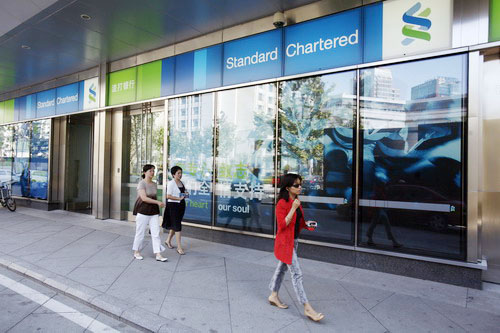Lift investment limit, official says
Updated: 2012-05-03 09:31
By Wang Xiaotian (China Daily)
|
||||||||
|
 A Standard Chartered Plc bank branch in Beijing. Foreign investors mostly want to have access to the domestic inter-bank and bond markets, and increasing the limits that apply to qualified foreign institutional investors will not do much to draw in long-term capital, according to an economist at Standard Chartered, which is a qualified foreign institutional investor. [Photo/Bloomberg] |
Increase for institutions will help make renminbi more convertible
China should further raise the investment limit on qualified foreign institutional investors and qualified domestic institutional investors to make the yuan easier to convert, said a senior official at the State Administration of Foreign Exchange.
Sun Lujun, director of the capital management department of the administration, said the priority in making the yuan more convertible should be placed on opening up the domestic capital market and individual capital accounts to the outside world.
He made the remarks in an article published in the magazine China Finance on Wednesday.
Sun said Beijing should lower the hurdles foreign investors must cross if they want to gain access to the domestic capital market, allow overseas institutions to raise funds in the Chinese capital market through the launch of an international board, allow Chinese individuals to invest in overseas industries and securities and continue to increase quotas for renminbi qualified foreign institutional investors, or RQFII, which allows them to invest in the mainland using yuan they collected outside China.
In early April, China announced it would raise the QFII quota by $50 billion, taking it to $80 billion. That was the largest such increase seen since the program was introduced in 2002. The limit for RQFII was meanwhile increased by 50 billion yuan ($7.9 billion) from the previous limit of 20 billion yuan.
The China Securities Regulatory Commission said in a statement that it might continue to improve the qualified foreign institutional investor program in order to channel more foreign long-term money into the domestic capital market.
Li Wei, a senior economist at Standard Chartered Bank (China) Ltd, said foreign investors mostly want to have access to the domestic inter-bank and bond markets, and increasing the QFII quotas will not do much to draw in long-term capital.
Li said the case is different, though, for qualified domestic institutional investors.
"An increase in their quotas would be more practical, although the fact that the yuan cannot be freely converted is expected to restrict outbound investment," Li said.
Authorities are worried about the risks that are likely to be brought by large influxes of capital, said Liu Yuhui, director of the financial laboratory at the Institute of Finance & Banking at the Chinese Academy of Social Sciences, a prominent central government think tank.
Zhou Xiaochuan, the central bank governor, said in April that China looks closely at global liquidity when it makes policy decisions and tries to prevent large amounts of capital from flowing into the mainland when there is already a high amount of liquidity worldwide.
China's recent policies are mostly "opening windows for domestic investors to go from China to the outside world", said Kenneth DeWoskin, director of the China Research and Insight Center at Deloitte & Touche Financial Advisory Services Ltd.
"And the biggest change that they will bring is more ways that the yuan, China's national currency, can be collected to invest outside of China."
What China would like to see happen to outbound investments should likewise be permitted to happen to inbound investments, DeWoskin said.
The China Securities Regulatory Commission has deemed 158 institutions as qualified foreign institutional investors and only about 1.1 percent of the A-share market's value comes from such investors.
By April 16, the State Administration of Foreign Exchange had decided to allow 136 foreign institutions to invest nearly $25.2 billion in total, and 98 domestic institutions to invest $76.4 billion in total overseas.
In the first quarter of 2012, qualified foreign institutional investors have shown greater enthusiasm for investing in the domestic capital market.
Overseas investors opened 12 new accounts in Shanghai and Shenzhen in the first three months of the year, half the number of new accounts opened in 2011, according to data from the China Securities Depository and Clearing Corp Ltd.
wangxiaotian@chinadaily.com.cn

 Relief reaches isolated village
Relief reaches isolated village
 Rainfall poses new threats to quake-hit region
Rainfall poses new threats to quake-hit region
 Funerals begin for Boston bombing victims
Funerals begin for Boston bombing victims
 Quake takeaway from China's Air Force
Quake takeaway from China's Air Force
 Obama celebrates young inventors at science fair
Obama celebrates young inventors at science fair
 Earth Day marked around the world
Earth Day marked around the world
 Volunteer team helping students find sense of normalcy
Volunteer team helping students find sense of normalcy
 Ethnic groups quick to join rescue efforts
Ethnic groups quick to join rescue efforts
Most Viewed
Editor's Picks

|

|

|

|

|

|
Today's Top News
Health new priority for quake zone
Xi meets US top military officer
Japan's boats driven out of Diaoyu
China mulls online shopping legislation
Bird flu death toll rises to 22
Putin appoints new ambassador to China
Japanese ships blocked from Diaoyu Islands
Inspired by Guan, more Chinese pick up golf
US Weekly

|

|







